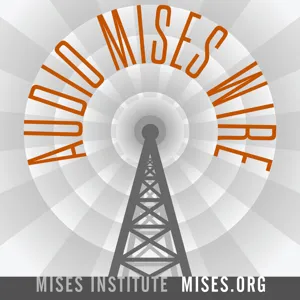Podcast Summary
Hegelian influence on Wilson's nationalism: Wilson, influenced by Hegel, saw individuals as parts of a larger societal hierarchy, with personal freedom subservient to national order and individual rights rewarded within the system without significant friction.
Woodrow Wilson, who was once viewed as a left-wing icon, held beliefs rooted in hierarchical nationalism influenced by philosopher Georg Hegel. Wilson, during his academic career, became absorbed by Hegel's ideas, which framed personal freedom as a national ideal within a larger societal hierarchy. He viewed individuals as parts of a living organism, such as a nation, and believed that individual rights were subservient to transcendent ideals of national order. Wilson equated freedom with the absence of disorder or friction, and believed a free people were those not subject to arbitrary rulers, with their interests and rights rewarded within the system without significant friction. However, it's important to note that Wilson's interpretation of Hegel may not be entirely accurate, as Hegel's philosophy of right also emphasizes individual freedom.
Rhetorical Presidency: Woodrow Wilson expanded the role of the federal government, utilized mass media for public communication, and emphasized the president's direct appeal to the public, leading to the development of the Rhetorical Presidency.
Woodrow Wilson believed in a strong central government to create a condition of True Liberty, reducing societal friction and focusing on productivity. He saw the president as the guiding force, with immense power both legally and morally, to helm the ship of state. Wilson put these beliefs into practice during his presidency, expanding the federal government's role in the economy, increasing public communication through news conferences and mass media like radio, and making sweeping changes to government structure. This approach, which emphasized the president's direct appeal to the public, came to be known as the rhetorical presidency.
Wilson's Expansion of Bully Pulpit Power: Wilson expanded bully pulpit power beyond news control, using mass culture and suppressing dissent during WWI, leading to the Espionage and Sedition Acts, impacting civil liberties
Woodrow Wilson expanded the bully pulpit concept beyond just using the news to control the national discourse. He utilized all levers of mass culture, even acting like a professor during press conferences to dictate what reporters should write. When America entered World War I, Wilson demanded unity and used this power to suppress dissent, including targeting blacks who demanded civil rights legislation with sedition charges. This led to the passage of the Espionage Act of 1917 and the Sedition Act of 1918, federal laws banning disloyal speech not seen since the John Adams presidency. Critics of Wilson and the war, such as William Trotter and A. Philip Randolph, were also targeted and prosecuted. It is important to acknowledge the impact of Wilson's actions on civil liberties, as this history is often overlooked by mainstream historians and political scientists.

